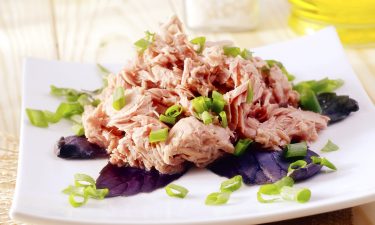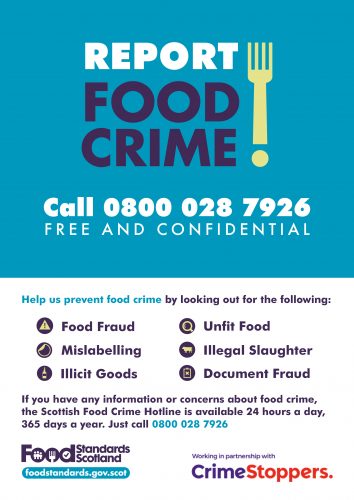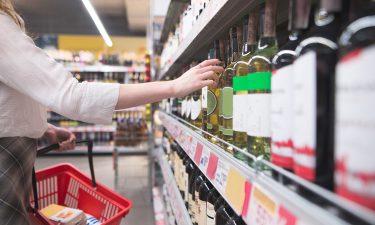The fight against food crime
- Like
- Digg
- Del
- Tumblr
- VKontakte
- Buffer
- Love This
- Odnoklassniki
- Meneame
- Blogger
- Amazon
- Yahoo Mail
- Gmail
- AOL
- Newsvine
- HackerNews
- Evernote
- MySpace
- Mail.ru
- Viadeo
- Line
- Comments
- Yummly
- SMS
- Viber
- Telegram
- Subscribe
- Skype
- Facebook Messenger
- Kakao
- LiveJournal
- Yammer
- Edgar
- Fintel
- Mix
- Instapaper
- Copy Link
Posted: 27 February 2020 | Roy McNaughton | No comments yet
From fake booze to adulterated tuna; Ron McNaughton, Head of Food Standards Scotland’s Food Crime and Incidents Unit, explains how it is working with partners worldwide in the fight against food crime.


Operation Opson (meaning food in ancient Greek) was first launched in 2011 and is an annual international initiative coordinated by Europol and Interpol which encourages contributing countries to get together and run targeted activities to tackle food crime and unsafe food.
Primarily, it is about protecting public health and fighting organised crime groups involved in food crime, but it is also about enhancing international cooperation between law enforcement agencies, food agencies, local authorities and private partners from the food industry.
The Scottish Food Crime and Incidents Unit (SFCIU) is the incidents, investigations and intelligence gathering arm of Food Standards Scotland (FSS). It has a dedicated intelligence office based in Aberdeen – staffed mainly by ex-police personnel – and analyses, develops and actions information received from members of the public, food business operators and industry whistle-blowers.
Over €100 million worth of potentially dangerous food and drink was seized in last year’s Operation Opson.
FSS is the joint UK-lead with the Food Standards Agency’s (FSA) National Food Crime Unit for Operation Opson IX, which was launched in December 2019 and will run until April 2020. More than 80 countries will be taking part in this year’s initiative to tackle the issue of counterfeit and sub-standard food and drink.
Over €100 million worth of potentially dangerous food and drink was seized in the last year’s Operation Opson. The SFCIU was heavily involved in the Europe-wide operation that led to approximately 700 arrests, and investigations are still ongoing in many countries. Police, customs, national food regulatory authorities and private sector partners also took part in the five-month operation. Cooperation and coordination between enforcement authorities across the EU, and around the world, is vital and has led to the seizure of millions of fake and possibly harmful products. It has also helped to take down several transnational criminal networks.


Be careful when selecting your alcoholic beverage – if products are heavily discounted and the offer seems too good to be true, the chances are it probably is not genuine
In total, some 16,000 tonnes and 33 million litres of potentially dangerous fake food and drink were seized after 67,000 checks were carried out at shops, markets, airports, seaports and industrial estates across the continent. As in previous operations, illicit alcohol was the most seized item, totalling more than 33,000 metric tonnes.
Counterfeit booze is one of the most prevalent and significant contributors to food crime. Whilst the vast majority of alcohol produced and sold in the UK is legitimate, criminals and organised crime syndicates will take advantage of any opportunity to make a profit and the New Year can be a peak period for those looking to offload fake alcohol. Vodka, wine, champagne and other alcoholic beverages are known to be made and sold illegally.
In Scotland, we are working with partners such as Police Scotland and local authorities to develop intelligence-led operations against criminals who peddle fake booze and seek to make profits that put the health of consumers at risk. We are also working closely with industry to better understand how big of an issue fake alcohol is here.
Fake alcohol is no laughing matter and could have serious health consequences for anyone drinking it, as they have absolutely no idea what it could contain. Some of the side effects can include vomiting, permanent blindness and kidney or liver problems. In the Czech Republic in 2012 there were 50 deaths due to methanol poisoning from fake vodka. Toxic ingredients found in counterfeit booze, such as methanol, are used to replace the ethanol that is used in properly produced and certified alcoholic drinks. Other commonly used replacements include isopropanol, which is found in antifreeze and screen wash.
It’s not always easy to spot fake alcohol, but there are a few clues to look out for that can help:
- Is it exceptionally cheap?
- Does it have an unfamiliar, or poor quality label?
- Does it have an unusual or strong smell – such as nail varnish – or contain sediment?
- Have you been exceptionally unwell after drinking it?
To help avoid the danger counterfeit alcohol poses, you should always buy alcoholic drinks from reputable sources. If products are heavily discounted and the offer seems too good to be true, the chances are it probably isn’t genuine. If any alcohol tastes or smells bad, don’t drink it!
In total, some 16,000 tonnes and 33 million litres of potentially dangerous fake food and drink were seized after 67,000 checks were carried out at shops, markets, airports, seaports and industrial estates across the continent.
By purchasing counterfeit products people are also helping to fund criminal enterprises, so it is really important that teams such as the SFCIU work with other partner organisations internationally to ensure these types of crimes are investigated and tightly policed. Awareness campaigns can also help to keep consumers and the licensed trade informed of the dangers of fake alcohol. As criminals become more sophisticated, crime-fighting agencies have to be more vigilant in order to help the public and deter wrong-doers.
Operation Opson has a solid track record of success, but it is a constant battle against criminals. In 2017, the SFCIU agreed to work with colleagues from 10 countries including Switzerland, Germany and Norway, and the FSA’s National Food Crime Unit on tackling the illegal tuna trade. Fresh tuna has a natural red pigmentation that turns brown over time as protein is oxidised. Histamine levels also increase as the tuna ages, altering the structure of flesh. We became aware that tuna primarily intended for the canning industry was actually being sold as natural fresh tuna – a crime that could potentially be worth more than €200 million each year. The tuna is injected with nitrates and nitrites to improve the colour so that it appears fresher or higher quality than it actually is.

A small amount of tuna samples taken at the time from across Europe showed that illegal treatment was likely. These activities contributed to the seizure of 51 tonnes of fraudulently processed tuna across Europe. Not only do criminal activities such as this pose a food safety risk, but consumer trust and confidence can also be damaged, severely impacting legitimate industry. The illegal treatment of tuna is an established, ongoing and highly organised criminal practice which is taking place across Europe and in third countries exporting into the EU and further afield. To tackle this, we have worked with the Food Industry Intelligence Network (FIIN) and all the countries involved to produce a problem profile, and we have made 15 recommendations for consideration of being adopted by all EU member states.
Cross-border cooperation is essential if we are to continue to tackle food crime.
It’s not only Operation Opson where the SFCIU is having a significant impact. The SFCIU investigations team looks into instances of food crime and supports local authorities with enquiries into serious breaches of food safety, also assisting with complex and protracted investigations.
In addition to tackling fake alcohol, other high‑profile successes include action taken against Hebridean Sea Salt, which uncovered that more than 80 percent of the salt found in the product did not originate in the Hebrides, but was imported table salt from Israel.
This kind of deception leads to lack of trust in high quality products and can also have a significant economic impact, so food authenticity is a key focus for the SFCIU.
Earlier this year we took part in an action led by the UK targeting the sale of 2,4-Dinitrophenol (DNP), a toxic chemical which is sold as a fat burner (predominantly online) and in health clubs and gyms. Consumption of DNP can have severe consequences for the health of consumers and has proven fatal in a number of instances.
A number of seizures were made and some cases are still working their way through the criminal justice system. Through these seizures, it is estimated that the equivalent of over 50,000 capsules of DNP have been prevented from entering the consumer market.


In 2017, the SFCIU worked with colleagues from 10 countries to tackle the illegal tuna trade
Food fraud affects all types of products and is a global menace. In the UK it costs the economy around £1.2 billion each year. It deceives customers and puts consumers’ health at risk.
Law enforcement agencies cannot tackle food crime without the support of the public and particularly those who work in the food and drink industry. FSS and independent charity, Crimestoppers, launched the free Scottish Food Crime Hotline in 2016 to give members of the public and industry a dedicated place to report anonymously any suspicions of food crime. The confidential hotline number (08000287926) is operational 24 hours a day, seven days a week.
Counterfeit and substandard food and drink can make its way into the supply chain at any stage – from wholesale distribution networks to the local corner shop – and the increasing sale online is exacerbating the threat that food crime poses to the public.
Cross-border cooperation is essential if we are to continue to tackle food crime. Shared intelligence with our colleagues in the UK, Europe and around the world helps track and disrupt criminal routes to market. Coordination at national, regional and international levels is the best way to find and bring to justice those who seek to gain illicit profit and endanger the health of consumers. It is imperative that we continue to share information that keeps consumers in Scotland, and indeed globally, safe.
About the author
Ron McNaughton has been Head of the Scottish Food Crime and Incidents Unit since 2016 after being asked to build a food crime capability by the Chief Executive of Food Standards Scotland. A former Senior Police Officer in Scotland, he retired from the police in 2015, after 30 years’ service. During this period he served in a number of operational policing roles. For the last five years of his police service, he was specifically involved in leading the investigation into serious and organised crime as Force Authorising Officer and Head of Intelligence for Tayside Police. In that role he was responsible for all force covert activity. Latterly, Ron worked within the Police Service of Scotland’s intelligence function and performed the role of Intelligence Commander for the Ryder Cup at Gleneagles.
Issue
Related topics
Food Fraud, Food Safety, Regulation & Legislation, The consumer









